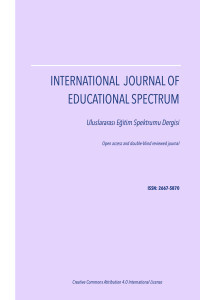Personal Entrepreneurial Competences among English Students in Entrepreneurship Education
Personal Entrepreneurial Competences among English Students in Entrepreneurship Education
___
- Ahmed, Mahtab. (2020). Exploring Entrepreneurial Intentions among University Students in Bangladesh. Published Theis. Retrieved from https://www.theseus.fi/handle/10024/355809
- Bacigalupo, M., Kampylis, P., Punie, Y., Van den Brande, G. (2016). EntreComp: The Entrepreneur- ship Competence Framework. Luxembourg: Publication Office of the European Union; EUR 27939 EN; doi:10.2791/593884
- Badan Pusat Statistik [Indonesia Statistic Bureau]. (2017, November 4). Laju Pertumbuhan Penduduk menurut Provinsi [Population Growth Rate by Province). Retrieved from Badan Pusat Statistik [Indonesia Statistic Bureau]
- Baptista, R., & Naia, A. (2015). Entrepreneurship Education: A Selective Examination of the Literature. Foundations and Trends in Entrepreneurship, 11(5), pp. 337-426.
- Barrientos-Báez, A., Martínez-González, J. A., García-Rodríguez, F. J., & Gómez-Galán, J. (2022). Entrepreneurial competence perceived by university students: Quantitative and descriptive analysis. Journal of International Studies, 15(2).
- Bejinaru, R. (2018), “Assessing students’ entrepreneurial skills needed in the knowledge economy”, Management & Marketing, Challenges for the Knowledge Society, Vol. 13, No. 3, pp. 1119-1132, DOI: 10.2478/mmcks-2018-0027.
- Carretero, S., Vuorikari, R., & Punie, Y. (2017). DigComp 2.1: The Digital Competence Framework for Citizens with eight proficiency levels and examples of use (No. JRC106281). Joint Research Centre (Seville site).
- Chien-Chi, C., Sun, B., Yang, H., Zheng, M., & Li, B. (2020). Emotional Competence, Entrepreneurial Self-Efficacy, and Entrepreneurial Intention: A Study Based on China College Students' Social Entrepreneurship Project. Frontiers in psychology, 11, 547627. https://doi.org/10.3389/fpsyg.2020.547627
- Creswell, J. W. (2012). Educational research Planning, conducting, and evaluating quantitative and qualitative research (4th ed.). Boston, MA Pearson
- Edokpolor, J.E. (2020), "Entrepreneurship education and sustainable development: mediating role of entrepreneurial skills", Asia Pacific Journal of Innovation and Entrepreneurship, Vol. 14 No. 3, pp. 329-339. https://doi.org/10.1108/APJIE-03-2020-0036
- Ghina, A. (2014). Effectiveness of Entrepreneurship Education in Higher Education Institutions. Procedia – Social and Behavioral Sciences, 115, pp. 332-345.
- Jibbe, H. (2018). The Relationship between Entrepreneurial Skills and Intentions. Published thesis on https://www.theseus.fi/bitstream/handle/10024/150602/The%20Relationship%20between%20Entrepreneurial%20skills%20and%20Intentions.pdf?isAllowed=y&sequence=1
- Klofsten, M. (2000). Training entrelireneurshili at universities: A Swedish case.Journal of Euroliean Industrial Training, 24(6), 337-344.
- Kirdasinova, K.A., &amli; Kurmanov, N.A. (2019). Modern mechanisms of innovation management in the develoliment of entrelireneurshili of the Reliublic of Kazakhstan. Interim reliort, Nur-Sultan, L.N. Gumilyov ENU.
- Kyguolienė, A., & Švipas, L. (2019). Personal entrepreneurial competencies of participants in experiential entrepreneurship education. Organizacijų vadyba: sisteminiai tyrimai, (82), 37-51.
- Li, L. & Dandan Wu. (2019). Entrepreneurial education and students' entrepreneurial intention: does team cooperation matter?. J Glob Entrepr Res 9, 35 (2019). https://doi.org/10.1186/s40497-019-0157-3
- Lizote, S., Verdinelli, M., Nascimento, S., & Bervian, L. (2018). Entrepreneurial Competencies and Performance of Undergraduate Programs: A Study of Its Relations Based on Center Directors’ Perspective. Journal of Education and Research in Accounting, 12(2), pp. 197-209.
- Morris, M.H., Shirokova, G. and Tsukanova, T. (2017) ‘Student entrepreneurship and the university ecosystem: a multi-country empirical exploration’, European J. International Management, Vol. 11, No. 1, pp.65–85.
- Noerhartati, E., Soesatyo, Y.. Moedjito, Hariyati, N., Jatiningrum, C. (2020). Student Entrepreneurial Competences in Industrial Era 4.0: Evidence in Indonesia Higher Education. PalArch’s Journal of Archaeology of Egypt / Egyptology, 17(6), 7185-7200. Retrieved from https://archives.palarch.nl/index.php/jae/article/view/1988
- Prastyaningtyas EW dan Arifin Z. (2019). Pentingnya Pendidikan kewirausahaan pada Mahasiswa dengan Memanfaatkan Teknologi Digital sebagai Upaya Menghadapi Revolusi 4.0. Proceedings of the ICECRS. 2:1. doi: 10.21070/picecrs.v2i1.2382
- Reyes, Gemma U. & Mariano, Rachelle A. & Herrera, Maria Noriza Q. & Manipol, Nohreen Ethel P. & Cubardo, Jewel Joanna S., 2018. "Personal Entrepreneurial Competencies and Entrepreneurial Intention of Non-Business Students Enrolled in an Introductory Entrepreneurship Course,"Journal of Economics, Management & Agricultural Development, Journal of Economics, Management & Agricultural Development (JEMAD), vol. 4(1), June.
- Robles, L., & Zárraga-Rodriguez, M. (2015). Key Competencies for Entrepreneurship. Procedia Economics and Finance, 23, pp. 828-832.
- Romero, R. S., & Nalangan, R. M. (2023). Assessment of Personal Entrepreneurial Competencies Of University Of Mindanao Graduating Business Students. International Journal of Industrial Management, 17(1), 50-59.
- Simovic, Vladimir. (2020). The Factor Affecting the Level of Digital Entrepreneurial competences of University Students. Economic Analysis, Vol. 53, no. 2, 145-155
- Vejayaratnam, N., Paramasivam, T., & Mustakim, S. S. (2019). Digital Entrepreneurial Intention among Private Technical and Vocational Education (TVET) Students. International Journal of Academic Research in Business and Social Sciences, 9(12), 110–120.
- Yin, M. dan Wang, Y. (2017). Research on the Effect of Enttrepreneurship Education on College Students’ Entrepreneurial Capability. EURASIA Journal of Mathematics Science and Technology Education., 13 (8): 5813 - 5819
- Zarefard, M., & Cho, S. (2017). Relationship Between Entrepreneurs Managerial Competencies and Innovative Start-Up Intentions in University Students: An Iranian Case. International Journal of Entrepreneurship, 21(3), pp. 1-12.
- ISSN: 2667-5870
- Yayın Aralığı: Yılda 2 Sayı
- Başlangıç: 2019
- Yayıncı: Hakan ULUM
Personal Entrepreneurial Competences among English Students in Entrepreneurship Education
Middle School Science and Mathematics Teachers' Views on Science-Mathematics Integration
Kürşat KURT, Kemal İZCİ, Mustafa PEHLİVAN
Biyoloji Öğretiminde Gerekli Görülen Öğretim Stratejilerinin Belirlenmesi
Development of Attitude Scale Towards the Use of Technology in Primary School Science Course
Okula Başlama Yaşı: Okula Başlama Kararında Esnek Bırakılan Üç Ay ve Ötesi
Yüksek Öğretimde Çevrimiçi Öğrenci Katılımı: Bölüm 1 – Teori
Stress Experienced by Special Education Teachers and Coping with Stress
Fulya AKGÜL, İsmail ÇELİK, Özcan İKBAL, Serkan ATİLLA, İbrahim KUZ, Gökmen KEKLİK, Abdullah SADAN
Online Extensive Reading: A Friend or Foe
